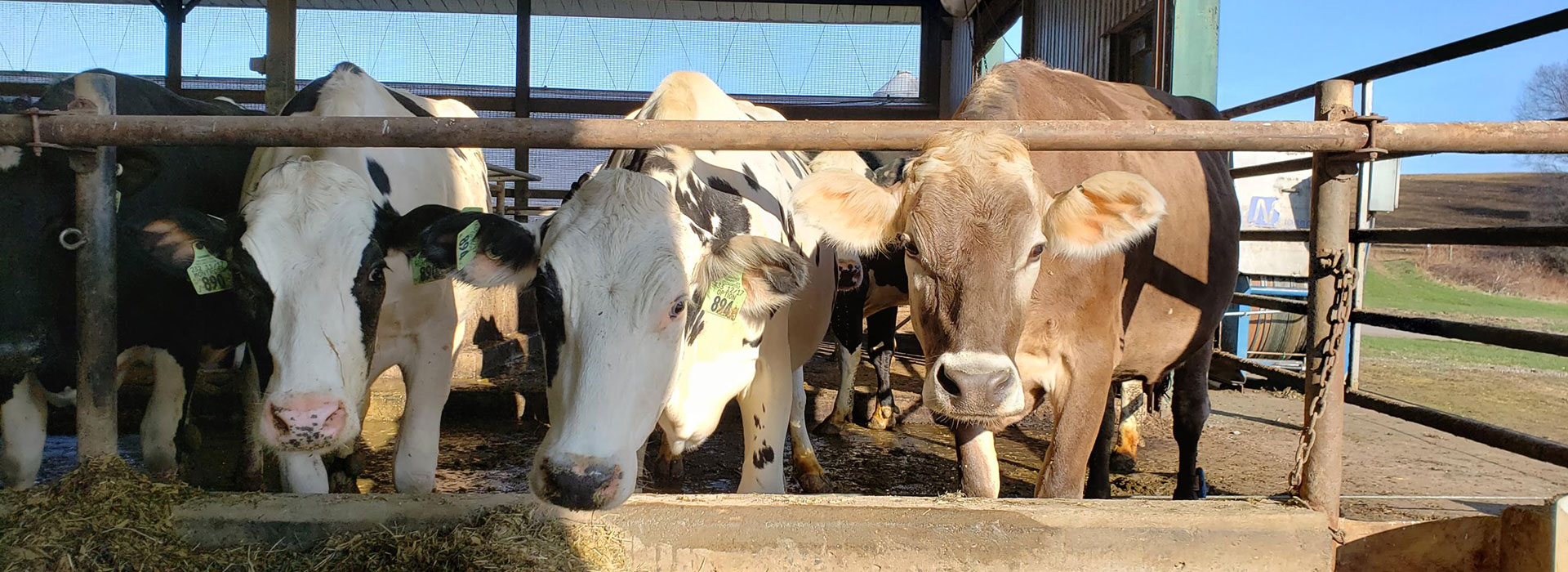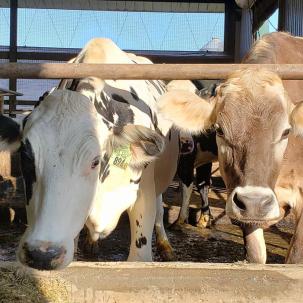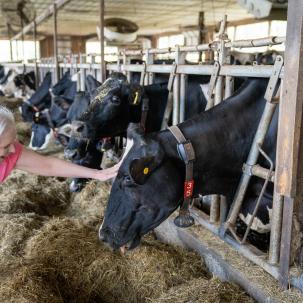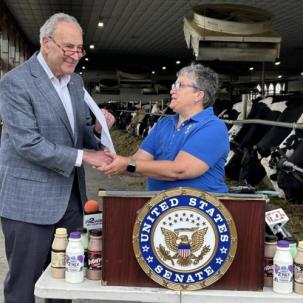U.S. Senate Majority Leader Charles E. Schumer and U.S. Senator Kirsten Gillibrand secure funding for SUNY Morrisville to purchase three robotic milkers
SUNY Morrisville’s dairy program will be getting new equipment that will help put its ag students on the cutting edge in the industry.
Through the advocacy of Sen. Charles Schumer and Sen. Kirsten Gillibrand, SUNY Morrisville was awarded $1.36 million in congressionally directed spending in the appropriations bill signed by President Biden.
These funds will purchase three robotic milkers for the college’s Arnold R. Fisher Dairy Complex, a free-stall dairy facility and learning laboratory for students, which houses 185 milking cows, as well as an electronically enhanced milking parlor and a student-managed computer system.
“By integrating robotic milking technology, we are positioning our Arnold R. Fisher Dairy Complex as a leader in innovative and sustainable dairy practices,” said Tony Contento, dean of the School of Agriculture, Business & Technology.
Robotic milking is a voluntary milking system that allows cows to set their own milking schedule.
“These funds were extremely competitive and we are so grateful to Senators Schumer and Gillibrand for working tirelessly to bring these funds to SUNY Morrisville so that our faculty and students can lead the way in the agriculture industry,” said SUNY Morrisville President David Rogers.
“Dairy is New York’s primary agricultural product and it’s critical that our future farmers get direct experience with the latest technology in the industry,” Gillibrand said. “I am proud to have secured this funding for SUNY Morrisville to purchase a robotic milking system so it can provide an enhanced student learning experience and increase efficiency and productivity at its dairy complex. As a member of the Senate Committee on Agriculture, I have been and will continue to be a tireless advocate for New York’s dairy farmers.”
“I am proud to deliver this $1.36 million for SUNY Morrisville’s cutting-edge robotic dairy milker project,” Schumer said. “This award will help catalyze the development of transformative and innovative agricultural technology right here in the heart of Central New York and it will help Upstate New York’s Dairy industry to grow and prosper, ensuring our rural farmers can take on 21st century challenges and are prepared for the future of the industry.
“Like I always say, the best milk comes from happy, healthy, Upstate NY dairy cows,” Schumer added. “Thanks to this investment, SUNY Morrisville will have the resources required to educate our future dairy workforce on the latest in dairy milking technology and help chart a sustainable path forward for our regional dairy farmers so our local dairy sector remains the cream of the crop.”
SUNY Chancellor John B. King, Jr. said, “New York is one of the largest dairy-producing states in the country; that’s why it is so critically important for SUNY students to get hands-on experience with the latest agriculture technology. Thanks to the efforts made by Senate Majority Leader Charles Schumer and Senator Kirsten Gillibrand, this funding will enable SUNY Morrisville students to be at the forefront of the future of dairy farming.”
The project will allow not only faculty and students to train on robotic milkers, but also to develop protocols for the rest of the dairy industry, to train local farmers and to act as a hub of innovation and progress as dairy evolves to meet the needs of today.
“The investment in dairy robotics is evidence of the importance and support of the dairy and agricultural programs at SUNY Morrisville, now and well into the future,” said Ashley Marshall, associate professor of dairy science.
“In combination with our new Dairy and Specialty Crops incubator, this will not only benefit our students and faculty, but also contribute to the advancement of the dairy industry as a whole in New York State,” Contento said.
What robotic milking technology provides:
- Enhanced Student Learning: Robotic milking units provide a unique opportunity for students to gain firsthand experience with cutting-edge dairy technology. Students can observe cow behavior, learn about automated milking processes, and analyze the data collected by the system. This hands-on learning experience will prepare them for successful careers in the modern dairy industry. The college will also be able to offer new workforce development and microcredential trainings to dairy farmers and industry partners from around the state.
- Improved Animal Welfare: Robotic milking systems allow cows to choose when they want to be milked, which may lead to reduced stress and improved overall cow health. This aligns with SUNY Morrisville’s commitment to providing its animals with the highest standards of care.
- Increased Efficiency and Productivity: Robotic milking operates 24/7, potentially increasing milk production and collection efficiency. This allows the college to optimize its dairy operations and potentially expand its educational and research activities.
- Data-Driven Management: Robotic systems generate valuable data on milk production, cow health and milking behavior. The data can be used to refine milking practices, identify potential health issues early and ultimately improve herd management. These 21st century practices will become a foundation for curriculum updates and industry training bootcamps.
About the Arnold R. Fisher Dairy Complex
SUNY Morrisville’s Arnold R. Fisher Dairy Complex, located on the west side of Eaton Street, features two growing heifer barns, weaned heifer barn, calf barn, maternity barn and a livestock/show barn to provide students with a true hands-on experience. The college’s 500 acres of cropland ensure a supply of forages for the herd.
The facility serves as a real-life learning laboratory for students in dairy and agriculture-related programs, providing them the opportunity to learn how to properly care for and manage animals on a dairy farm. It also offers a chance for community members to visit and learn more about how milk is produced on many commercial dairy operations in the United States.




